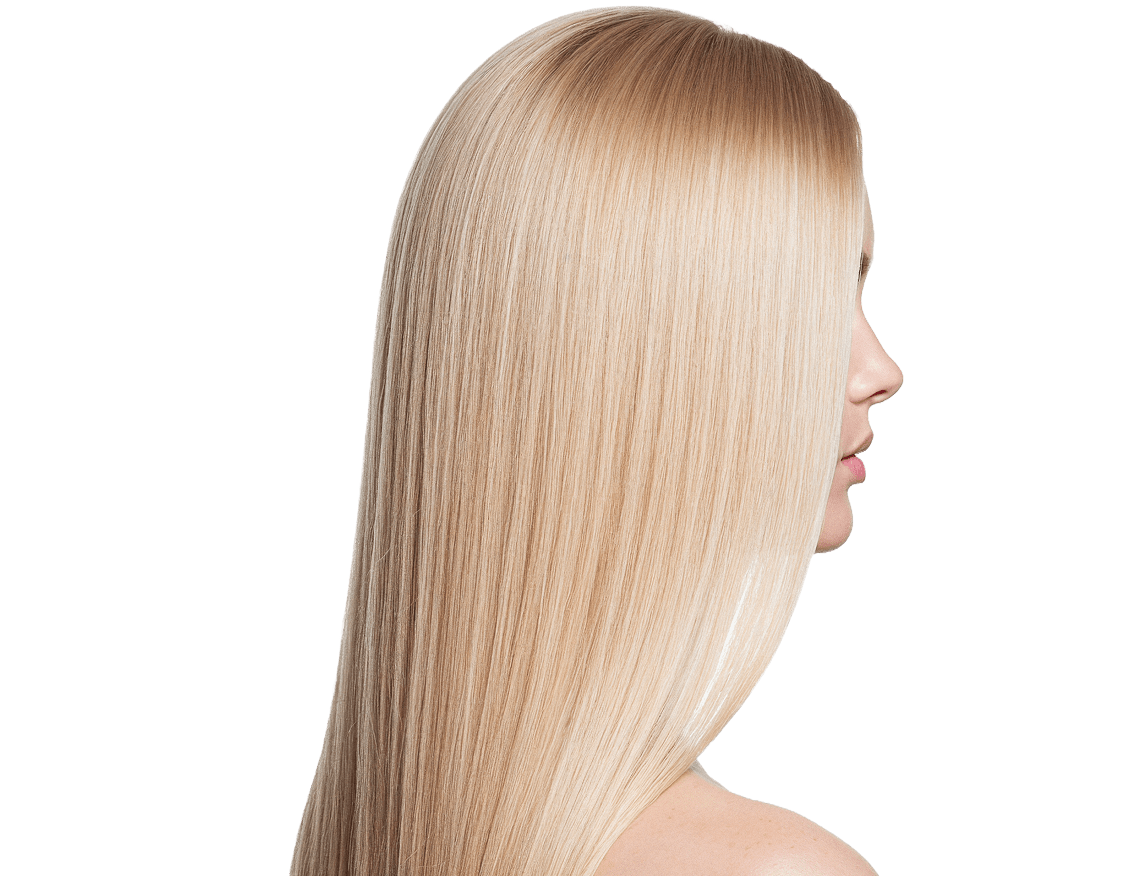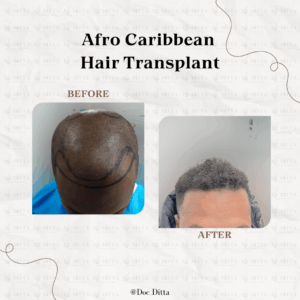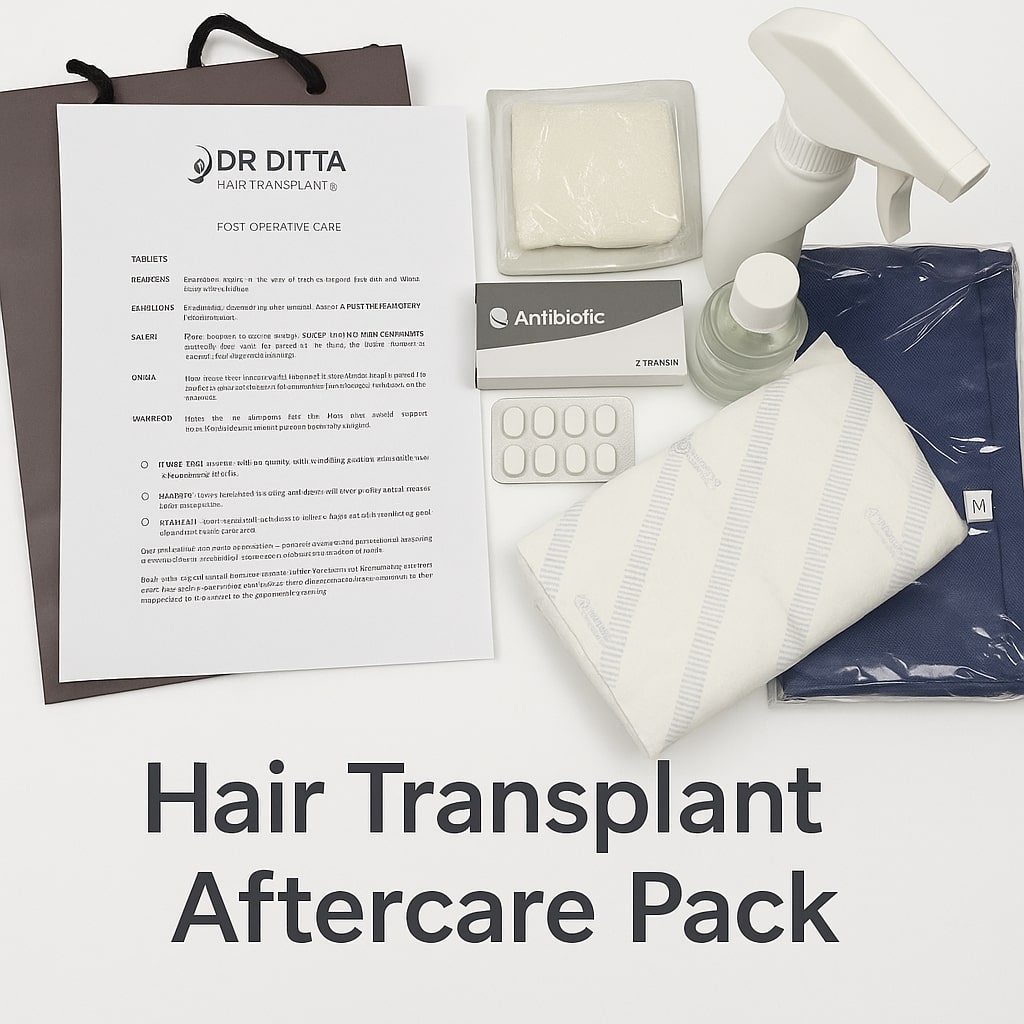Afro Hair Transplant

About Afro Hair Transplants
What Is an Afro Hair Transplant?
What Is an Afro Hair Transplant?
An Afro hair transplant is a specialised hair restoration procedure designed specifically for individuals with tightly coiled, Afro-textured hair. This hair type grows from curved follicles and emerges at a unique angle, requiring specialist techniques and meticulous precision to achieve optimal results.
Regardless of which method you choose, Dr. Ditta Hair Transplants is committed to delivering long-lasting, natural-looking results that match the texture and growth pattern of your existing hair.
Understanding Hair Loss Factors in Afro-Textured Hair
Hair loss in Afro hair types can be influenced by multiple causes, including:
- Genetics and family history
- Hormonal imbalances and changes
- Environmental factors and heat or chemical styling damage

Should You Have an Afro Hair Transplant?
If you’re experiencing thinning edges, bald patches, or traction alopecia from years of tight styling, an Afro hair transplant could be the permanent solution you’ve been looking for. Many people with Afro-textured hair struggle to find suitable treatments—but modern techniques like FUE now make it possible to restore natural density and shape without compromising your curl pattern.
At Dr. Ditta Hair Transplants, we understand the importance of both aesthetics and cultural hair identity. If hair loss is affecting your confidence or day-to-day life, a tailored transplant procedure can help you regain not only your hair—but your self-assurance, too.
Afro-textured hair demands expert knowledge of its curl pattern and follicle structure. Dr. Ditta brings extensive experience and a personalised approach to every procedure, ensuring each graft is placed with precision and care.
Using advanced tools and custom implantation plans, we recreate natural density and hairlines that suit your features. From consultation to aftercare, we prioritise comfort, confidence, and consistently natural-looking results.
How Much Does an Afro Hair Transplant Cost?
At Dr. Ditta Hair Transplants, Afro hair transplant procedures start from £3,499. The final cost depends on several factors, including the number of grafts required, procedure type (FUE or DHI), and the complexity of the case.
Be cautious of unusually low-cost offers, which may result in overharvesting the donor area or using underqualified technicians. The quality of your hair transplant often reflects the experience of the surgeon and the clinic’s standards—so it’s worth investing in expert care.
Recovery and Aftercare
After your Afro hair transplant, it’s normal to experience mild swelling, redness, and tenderness in the treated areas. Recovery is straightforward when supported by proper aftercare.
Here’s how to manage your healing process:
- Pain Relief: We’ll supply mild painkillers to keep you comfortable during the first few days.
- Rest: Prioritise rest and avoid unnecessary physical stress after the procedure.
- Avoid Heavy Activity: Refrain from intense workouts or sweating for at least 2–3 weeks.

Afro Hair Transplant Aftercare Pack
Every patient at Dr. Ditta Hair Transplants receives a complete aftercare kit, carefully prepared to support healing and healthy hair growth. The pack includes all essential items, along with clear instructions to help you recover smoothly and maximise your results. Using the products as directed is key to achieving the best possible outcome from your transplant.
We also include:
- Video Instructions
- Spray bottle for spraying head with saline solution
- Medication
- Shampoo for washing
Why Choose Dr. M Ditta?
At Dr. Ditta Hair Transplants, we specialise in advanced surgical techniques designed to create natural results and restore your confidence.
With 5+ years of consistent, high-quality results, we’ve earned the trust of our patients. Whether you’re considering your first transplant or looking to repair a previous transplant, Dr. Ditta and his team are here to provide expert care whenever you need it.
A track record of impeccable results and fantastic patient care
- Personalised Patient Care: At Dr. Ditta Hair Transplants, we focus on individual needs, offering honest guidance from your first enquiry to full recovery.
- Expert-Led Treatment: All procedures are performed by Dr. Ditta (GMC No. 7084372), a skilled surgeon with thousands of successful FUE transplants to his name.
- Experienced Support Team: Dr. Ditta’s technicians are highly trained—alongside Dr Ditta, they have performed 1000’s of procedures.
- Natural, Confident Results: We’re proud to deliver natural-looking outcomes that help restore not just your hair, but your confidence too.
Afro Hair Transplant Procedure FAQs
Afro hair transplants are ideal for Black and mixed-heritage individuals of all genders. Due to the tightly curled nature of Afro-textured hair, this procedure demands expertise and care—but in the hands of an experienced surgeon like Dr. Ditta, it’s a safe and effective solution. Below are some frequently asked questions to guide you:
Which method is better for Afro hair—FUE or FUT?
FUT is often recommended for tightly coiled hair, as it reduces the risk of damaging curved follicles during extraction. However, if your curl pattern is looser, FUE may still be a suitable option. A personalised scalp and hair assessment will determine the best approach for you.
Is the procedure painful?
No, the transplant is performed under local anaesthetic, so you won’t feel pain during the procedure. Post-surgery discomfort is mild and manageable with painkillers provided as part of your aftercare.
When will I notice results?
You’ll see the initial outline of your new hairline immediately. Noticeable growth begins around 4–6 months, with full results visible between 12–18 months after surgery.
Are the results permanent?
Yes, the transplanted hair is permanent. However, to support long-term density and reduce future hair loss, treatments like Minoxidil can be beneficial.
What’s the recovery time like?
Recovery varies by technique:
FUE: 5–7 days for most patients
FUT: 7–14 days due to the small incision
Avoid vigorous activity for at least one week, and consider taking a few days off work.
Are there any side effects?
Mild swelling, tenderness, or itching around the scalp are normal and usually resolve within 3–4 days. Anti-inflammatory and pain relief medications are included in your aftercare package to ensure comfort.
